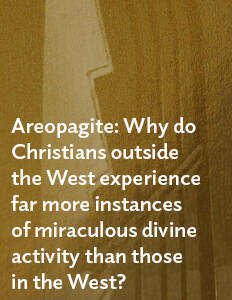 The topic to be discussed in the present Areopagite is quite intriguing: why do Christians outside the West experience God’s miraculous activities more than Western Christians? This question can be crucial to understanding the quintessence of Christian faith. Before trying to answer it, I would like to define the popular word “miracle” first in light of my theological understanding of it. In a nutshell, putting one’s faith in Jesus Christ is a miracle. Jesus, as the Son of God, is not only imperceptible to our physical vision but also goes beyond any human intellectual capacity.
The topic to be discussed in the present Areopagite is quite intriguing: why do Christians outside the West experience God’s miraculous activities more than Western Christians? This question can be crucial to understanding the quintessence of Christian faith. Before trying to answer it, I would like to define the popular word “miracle” first in light of my theological understanding of it. In a nutshell, putting one’s faith in Jesus Christ is a miracle. Jesus, as the Son of God, is not only imperceptible to our physical vision but also goes beyond any human intellectual capacity.
An Understanding of “Miracle”
Believing in him is an act both spiritual and miraculous. Faith cannot be solely a result of human “logic,” although logical deliberation is involved when one seeks to know God and to experience his grace. Indeed, every single person who comes to believe in Jesus thinks through many things and eventually makes his or her own decision whether or not to follow him. Conversion entails both intellectual and willful efforts.The miracle that takes place when one’s heart is transformed, as the person gives his or her allegiance to Jesus, can be more miraculous than other types of miracles. However, one’s conversion should still be regarded as a miracle because it is a result of God’s work with his or her mind. A miracle, then, refers to a divine action that God performs to help people experience his loving-presence, his healing touch, his salvific power, and the like, rather than merely implying a supernatural event that takes place unusually. For this reason, the miracle that takes place when one’s heart is transformed, as the person gives his or her allegiance to Jesus, can be more miraculous than other types of miracles, such as healing without modern medical assistance.
Jesus performed many miracles according to the Gospels. Each miraculous event was a divine action that led the people who experienced it to give their lives to the loving God. The Bible does not record what happened to the minds of those who experienced the miracles, but it can easily be speculated that they must have eventually given their allegiance to the Son of God, who touched them with his gracious power. Once the deaf person’s ears were miraculously opened, he could hear the voice of the Son of God who healed his deafness; the blind man could see him with his own eyes when he healed his blindness; and the first word of the mute person must have been a thanksgiving to the one who healed his dumbness (cf. Mt. 9:27–33; 12:22–23). Jesus performed those miracles to touch people with his compassion and awaken their slumbering spirits so that they could open their spiritual eyes to recognize who he was. The triune God has continuously performed this eye-opening miracle through the hands of his people in church history.
God’s Approach to People in Culture
Having made these points, we also need to acknowledge that God has not performed the miracle that transforms people’s hearts in the same manner. God has touched human minds in ways that are relevant to people in time and space. That is, God’s approach to people has always been culturally flexible so that they can clearly understand his message and experience his salvific power in their cultural context.Enculturation is an anthropological term referring to a society’s traditional education through which every member of the society learns cultural behaviors that conform to its social norms. God, then, is the best anthropologist and the most effective contextualizer! If so, it would be necessary even for us to view people as cultural beings as God would, and for this, we need some anthropological perspective.
Since people live in different locations and at different times, they are culturally different and historically distant; hence, there are countless different cultures throughout human history. This fact implies that people do not perceive and experience the world in the same way. Their perceptions of the world differ because they have learned differently about it during childhood through their cultural education in their home culture, which cultural anthropologists call “enculturation.” Enculturation is an anthropological term referring to a society’s traditional education (i.e., cultural upbringing) through which every member of the society learns cultural behaviors that conform to its social norms. This process of enculturation usually starts immediately after one’s birth and normally continues until the person enters into the stage of adolescence.See Caleb Kim’s Cultural Anthropology: From a Christian Perspective (Eldoret, Kenya: Utafiti Foundation, 2019), 26-31. People learn from their society how to behave, including thinking and feeling, throughout their childhood. It is through this enculturation process that people’s view of the world around them (i.e., “worldview”) is formed. Once the basic frame of their worldview is constructed in their minds, all the cultural assumptions that make up their worldview structure are typically taken for granted. People then behave according to their cultural worldview. Thus constructed, cultural worldview is hard to shatter unless people experience events that their worldview cannot hold. This worldview concept explains why Christians have a different understanding of the supernatural environment and experience it differently; the difference lies mainly in the different ways of enculturation.
Cultural Worldview as a Selective Mechanism
Interestingly, people’s cultural worldview determines the direction of their experience of the world around them. In other words, people tend to see things selectively in light of the worldview that has been constructed during their enculturation period. As they do that, they also experience environments (natural, supernatural, and social) in terms of their cultural worldview. Phenomenologically, not surprisingly, some things happen in the way that people culturally believe (or assume). It is especially true with the “supernatural world.” For example, in most societies of the majority world whose cultural worldview allows their members to deal seriously with the supernatural, their encounter with spiritual beings and forces can be part of their ordinary life experiences. For them, the miracles recorded in the Gospels are not something difficult to comprehend. It seems quite common for these Christians to experience more “supernatural events” than those whose worldview does not allow Their weakness, though, is that they may tend to dismiss any supernatural event either as superstition or as an unnecessary happening. for it. Their weakness is, however, that they may tend to focus solely on “miracles” and miss important messages that God wants to deliver through the miracles. In contrast, in societies that hold what may be called an Enlightenment worldview,For an anthropological discussion on the Enlightenment movement from a Christian perspective, see Kim’s book pp. 4-8. their members are less likely to have such a supernatural experience as do those whose cultural worldview allows for it. Impressively, people affected by an Enlightenment worldview still experience the “miracle” of having faith in God even without supernatural experiences. Their weakness, though, is that they may tend to dismiss any supernatural event either as superstition or as an unnecessary happening.For a critical assessment of the traditional Western worldview influenced by the Enlightenment movement, see Charles Kraft’s Christianity with Power: Your Worldview and Your experience of the Supernatural (Ann Arbor, MI: Servant Publications, 1989).
Another interesting observation is that both God and the evil ones (Satan and his demons) approach people by using human cultures. Even Satan knows how to contextualize his deception through people’s different cultural worldviews. As Paul stressed the importance of recognizing the devil’s schemes (2 Cor. 2:11), we ought to have both the intellectual faculty and spiritual discernment to understand how the enemy would deceive humanity, particularly God’s people. Although their supernatural ability is limited, demonic powers are still skillful at manipulating cultural forms that are familiar to people—in order to delude them. Their goal is clear; it is to keep people from getting close to the true God, so that they may fear or rely on anything but God. Since Satan’s target for evil deception is all humanity, demons are everywhere; even highly industrialized societies as in the West are no exception. Their primary deceptive strategy is a clever cultural disguise in different societies. I often feel embarrassed at the widespread assumption that there are more demons in Africa than in the West. Our spiritual enemy uses different tactics to con people into believing their lies within people’s cultural setting.
Toward a Balanced Approach to the Issue of Spiritual Dynamics
I am not saying that culture is evil. For me, it is rather a neutral entity. Every culture (and its worldview) has both bright and dark sides when we examine it from a Christian viewpoint. It can be used and empowered either by God or Satan. The Son of God entered into a human culture (specifically, Jewish) about 2000 years ago to save sinners. Satan has also been running his evil operation among human beings more than ever since being cast down to the earth, as he was crushed in the head through the death of Jesus on the cross (Rev. 12:12; cf. Gen. 3:15). Hence, we live in an epoch of spiritual Every culture (and its worldview) has both bright and dark sides when we examine it from a Christian viewpoint. warfare, which makes our cultures a spiritual battlefield in which we fight many deceptions coming from spiritual enemies. Perhaps the chief enemy is conspiring behind the shadows of so-called highly developed societies, with most people believing only in what their limited physical senses can see and prove. At the same time, the enemy likely scoffs at some people’s helter-skelter responses to spiritual events, many of which may be a result of the enemy beguiling people (see 2 Cor. 11:14). In both cases, the enemy’s goal is the same; it is to confuse the world about truth by pushing them to the extreme left or right of their cultural worldview. I see equal dangers on both sides. This negative assessment, however, can be rendered more positively: Scripture exhorts us as Christians neither to dismiss the spiritual events many people in the majority world commonly experience nor to indulge in them uncritically. As a Christian missiologist who has encountered both sides in many different cross-cultural settings, I would recommend that Christians be ready to learn from one another by giving more humble and careful attention to others whose experiences differ from our own.







Comments
Be the first one to make a comment!